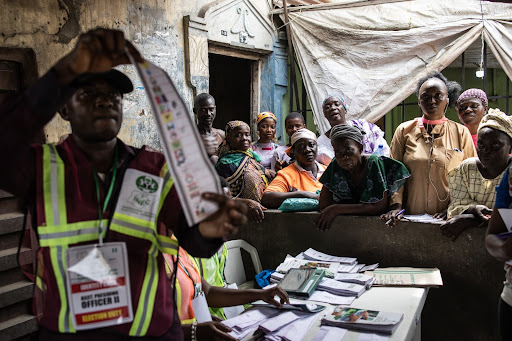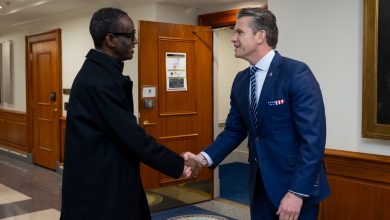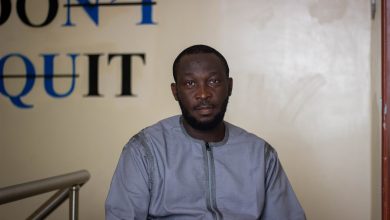Nigeria Elections 2023: A Look Ahead To The Gubernatorial Polls
What can we tell about the upcoming gubernatorial elections by looking at what occurred in the presidential polls? HumAngle reporters from across the country assess what just happened, and look ahead to what might happen on March 11.

Adejumo Kabir, Lagos
In Lagos, thugs scattered polling units in areas swinging toward opposition parties, marring the first weekend of the elections here.
There are palpable fears there may be further clashes between supporters of the candidates during the gubernatorial vote.
In the presidential polls, the Labour Party took Lagos State from the eventual winner of the presidency, Ahmed Bola Tinubu of the All Progressives Congress party.
The APC candidate is a former governor of Lagos and is considered the strongman of Nigeria’s most populous city. He, or his appointed candidates, have not lost the state to the opposition since 1999.
His party will be keen to prevent any upset on March 11, where they are aiming to secure a second term for the incumbent Babajide Sanwo-Olu.
#EndSARS
During the national elections, there was violence in areas where the Labour Party was popular. LP presidential candidate Peter Obi apparently caught the imaginations of young Lagosians.
Obi counted among his supporters in the state those mobilised by the 2020 #EndSARS protests, where demonstrators against police brutality were gunned down in Lekki.
He appealed to people who want political change, but also to people who were put off by the APC’s selection of a “Muslim-Muslim ticket”.
Peter Obi is also popular with Lagos’s large Igbo population, who saw his candidacy as the best chance the Southeast has had to gain the country’s top job.
In the coming governorship election, there could be violence in the strongholds of the Labour Party like Festac, Ojo, Ajeromi-Ifelodun, Eti-Osa, Alaba, and other areas of the state.
The electoral law empowers returning officers to cancel votes at polling units where there has been violence.
‘Brace up’
Leaders of the APC have threatened some of the local government officials of the party to “brace up” and work for the party or be sanctioned.
After the presidential poll, there were reports of Igbo residents of Lagos being threatened at their workplaces for voting against the APC. Although, the incumbent governor has also started making overtures to smooth things over and calm fears.
But intimidation could mean those who supported the Labour Party think twice before coming out to vote again. The party’s candidate for Governor, Gbadebo Rhodes-Vivour, does not currently have the same personal following as Peter Obi.
Security agencies, particularly the state police command, have assured Lagosians of their safety, but residents are scared that the governorship election may also be marred by violence.
Nathaniel Bivan, Kaduna
In Kaduna, there was no major record of election violence, but delays to the start and throughout the process meant voting spilled into a second day.
Logistical problems meant that polling units further away from the centre got their materials later. If repeated in the next round of elections, this could dissuade voters in remote areas from continuing to wait at their polling units.
In Dec. 2022, there was an eruption of terrorist violence in communities in southern Kaduna that are largely Christian.
People have been scattered from their homes and will likely have problems voting, which will depress the turnout in areas likely to go to opposition parties.
Split vote
Outgoing APC governor Nasir El-Rufai is handing over to a new candidate, the current Senator Uba Sani. The ruling APC has selected another Muslim as Sani’s candidate for deputy governor.
In the past, such choices have been politically difficult. But the APC is banking that a split in the opposition vote between the People’s Democratic Party and Labour Party will allow them to hold on to the Governor’s House.
There were also signs of malpractice in the presidential election. A woman was arrested with 18 voter cards in the Badarwa area. The party she was working for was not named by the Economic and Financial Crimes Commission (EFCC), which set up a sting operation to catch vote buyers.
Vote buying remains a possibility, especially now the Supreme Court has ruled old Naira notes remain valid until the end of the year.
Aliyu Dahiru, Kano
In Kano, there were two reported incidents of violence in the days immediately following the polls.
An office of election regulator, Independent National Election Commission, was burned down in Takai, about 47 miles from Kano city, and two people were reportedly killed when another INEC office was set ablaze in Tudun Wada, near the state border with Kaduna.
But the general elections themselves were generally peaceful in most local government areas (LGAs). The opposition New Nigeria People’s Party gained a majority of the seats in the National Assembly.
Kano voted overwhelmingly for NNPP presidential candidate Rabiu Kwankwaso, the only state to do so, evidence of Kano’s proudly independent political tradition.
No celebration
Despite this, the state has stayed cautious and calm, with no obvious winning celebrations. The reason is people dread what might be coming in the gubernatorial election.
Kano is more focused on the gubernatorial election than the presidential and national assembly polls. There is much more to be gained.
It will be a herculean task for the NNPP to take over the Governor’s House. The party is in opposition at this level, trying to seize power from the governing APC.
But the NNPP, with its powerful machine on the ground, has the best chance of upsetting outgoing APC governor Abdullahi Umar Ganduje’s plans to hand over to his chosen successor.
Thugs
In the build-up to the general election, political thugs of both parties had a field day, committing various crimes while hiding behind campaign movements. Because they work with politicians who are supposedly close to the government, these thugs operate with impunity.
In the run-up to the presidential poll, two men with handguns were arrested at a political disturbance, but they were soon released.
Kano is anticipated to be more intense between now and the upcoming gubernatorial election. The incumbent party will work to ensure it protects its seat, and the opposition party wrestles with all available resources.
Already, the NNPP has accused the APC of plotting to arrest and intimidate its members, and members of both parties have exchanged heated words.
Whenever two major opposition parties hold campaigns, they destroy each other’s campaign billboards and posters.
But if it stays at the level of property damage, Kano residents might consider themselves lucky.
Abubakar Gummi, Zamfara
Elections in Zamfara and Sokoto states were characterised by a meagre turnout.
Terrorists had threatened voters that they would be kidnapped if they travelled from areas under the control of armed groups to cast their ballot at polling stations set up, especially in supposedly safer towns.
In Zamfara turnout could have been as low as 23 per cent, according to figures from a results collation website.
There is no sign that things will be different in the next round of the elections.
Inducements
Politicians are keen to induce people to vote, offering transport to the polling units, food, and other items.
“How can credible elections take place under that condition?” asked Bashar Altine Isah, Sokoto State Coordinator for Movement for Social Justice and Good Governance.
He added: “Although it is the work of the Police to stop these vote-buying politics, they are weak and cannot stop that because even the people are not afraid of them.”
Saminu Mohammed, a resident of Gusau, told HumAngle: “There was prevalent and rampant vote buying by the politicians. This is almost all the polling units in the state, which I am sure is illegal according to INEC voting policy.”
“The military should be deployed!” he said.
Abdulkareem Haruna, Borno
For Borno state, the largest and most cosmopolitan of the six northeast states, the March 11 election will be complicated by the requirement that voters outside Maiduguri and a couple of other LGAs, vote in Internally Displaced People’s voting centres.
IDPs scattered over the state will again have to travel long distances to cast ballots at the voting centre for their original home community, as they did during the presidential election.
Borno state has about 2.5 million voters, but only 519,431 cast a vote during the presidential and national assembly polls, barely 21 per cent of the state’s registered voters.
The apparent voter apathy was exacerbated by the economic hardship brought about by the federal government policy on the new Naira notes.
However, the circulation of cash in the state has improved slightly and it may not present as much of a problem in the second weekend of polling.
Vote buying
It is expected that vote buying will intensify.
The next election will likely be fiercer than the national polls, the offices up for grabs are more locally relevant and the candidates are familiar to the populace. More personalities are on the ballot and the competition is tighter.
The contest for the governorship and state assembly elections is essentially between the ruling APC and the main opposition People’s Democratic Party, who have candidates for all the contested positions.
The “bandwagon effect” may also affect the outcome, as those who supported opposition parties before Feb. 25 may have their spirits dampened by the result of the presidential election. They could be vulnerable to manipulation.
The governorship contest was challenging, and observers expect tension in Maiduguri and Biu townships due to the toxic rivalry between the ruling party and the PDP candidates.
Chigozie Victor, Rivers
Compared to some other places, the voting process in Rivers was relatively seamless, updates from CODE election observers in the South-South state of Rivers showed.
But as the election moved into the counting and collation stage, accusations of irregularities began.
In a polling unit in Obio Akpor, the home LGA of Governor Nyesom Wike, an observer shared the counted results of the election, and said they suspected foul play. INEC staff at the venue refused to upload the results to the official INEC portal, the observer said.
A comparison of the results sheets seen by the observer, and the results on the official portal, show a discrepancy between the two, reports say.
Crossed out
There were other results sheets that showed irregularities. Observers in other polling units and LGAs also called in similar complaints of INEC staff either directly refusing to upload the results without explanation or citing network failure. Pictures of results sheets that had numbers crossed out and replaced with other numbers were circulating on social media.
Following the alarm raised at the counting stage, there were incidents of election-related violence. In Port Harcourt, a group of young men barred INEC employees from leaving a polling unit.
In Iwerre, protesting youths reportedly fired guns at traffic on the road in protest at what they said was the alteration of the election result that had been going toward a Labour Party win.
There were two deaths reported in Ubinmi community, Emohua Local Government Area, that were said to have happened during unrest connected to the election.
Successor
Other issues, such as thugs beating up voters for recording malpractice by INEC staff, fights erupting due to the refusal of INEC staff to upload results, and the absence of security agents in some polling units were also reported.
The governor of the state Nyesom Wike, has come to the end of his second term as governor. It has been reported that Wike has fallen out with the PDP at a national level. His appointed successor is Siminalaye Fubara, who Wike has nevertheless pledged to support.
Following Wike’s apparent move to help the APC take the state in the presidential polls, it is thought that momentum could remain with the APC and their candidate, businessman Tonye Cole.
This has raised fears of the possibility of election-related violence during the gubernatorial polls.
Wike’s LGA, Obio Akpor, could be a likely location for agitation. Going by the Presidential poll, the Labour Party’s Peter Obi appeared to have a following there.
Support Our Journalism
There are millions of ordinary people affected by conflict in Africa whose stories are missing in the mainstream media. HumAngle is determined to tell those challenging and under-reported stories, hoping that the people impacted by these conflicts will find the safety and security they deserve.
To ensure that we continue to provide public service coverage, we have a small favour to ask you. We want you to be part of our journalistic endeavour by contributing a token to us.
Your donation will further promote a robust, free, and independent media.
Donate HereStay Closer To The Stories That Matter




